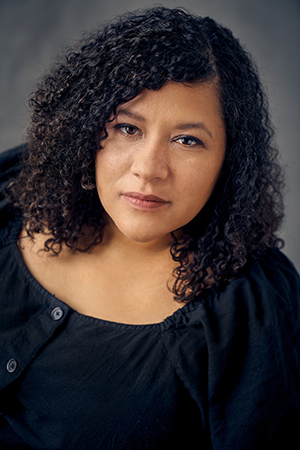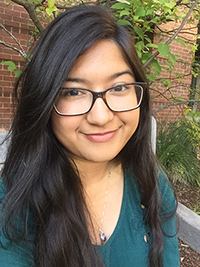Stories That Change You: Tanisha Khan in Conversation with Zilla Jones

Malahat Review volunteer Tanisha Khan talks with Zilla Jones, 2022 Open Season Awards contest fiction judge, about the limitations and freedoms of a 2,500-word story, the research involved in writing historical fiction, and the importance of endings.
Zilla Jones is an African-Canadian criminal defence lawyer, anti-racism educator, mother, singer, and writer from Treaty 1 in Winnipeg. “Crossing” won The Malahat Review’s 2021 Open Season Fiction Award. She has been longlisted for the CBC Short Story Prize and shortlisted twice for the Writers Union of Canada short prose competition, The Fiddlehead fiction contest, the Missouri Review Perkoff Prize for fiction, and the Freefall Magazine prose contest. She won Honourable Mention in the Room Magazine fiction contest, first place in Prism Magazine's Jacob Zilber short prose competition, and first place in the GritLit Festival short story contest. Her work has appeared in Prairie Fire.
As a judge what are you searching for in a winning story?
I want to read the story that only you can write—the one that is in your heart demanding to be released, that doesn’t let you rest until you write it down. I want stories that fill my head long after I have stopped reading, that help me see the world a little differently because they have changed me. At this point, you are probably all asking, what exactly is she talking about? So I’ll try again. In writing a 2,500-word story, think about both the limitations and the freedoms of such a tight word count. You can’t tell a big epic tale about a person’s whole life or events that unfold over several days, weeks or years. You have to be very sparing with back story and extraneous description. You can’t have a massive cast of characters. You need to give me a slice, a moment, a day in the life, a single interaction. And in that short time, you must draw at least one unforgettable, unique, compelling character and take me to some kind of discovery or realization. Bonus points if you can play a little with the form and structure of the short story or if you have thought carefully about point of view and perspective: who needs to tell this story and why, and does the voice draw the reader in? Another thing: we don’t talk enough about plot in literary fiction. A great character, an interesting setting, searing dialogue: all wasted if the story doesn’t go anywhere and something intriguing doesn’t happen. And lastly—think about your ending. I want to see strong, moving endings that have arrived, that are exactly the point where this story should finish, where things are resolved and yet there is more to think about. We spend a lot of time on our beginnings, and often the endings fizzle out. Don’t fizzle out!
I know that many authors have different approaches when it comes to editing their stories, especially in those final passes before submission. What does your editing process generally look like?
I don’t really outline or plan most of my stories, but I do almost always know how they will end before I start writing (see my earlier point about endings.) So my goal is to start as close to the end as I can, and when I am editing, I check to see if that was accomplished. Usually, I need to chop chunks off the beginning, get rid of unneeded backstory and tweak the beginning now that I know how the whole story unfolds. Then it is a matter of checking for the usual suspects: repeated words, tired clichés, superfluous descriptions, unclear sentences and so on. I benefit greatly from feedback so I try to always run the stories for which I have the highest hopes by one of my writing groups, writing partners and/or an editor or mentor, and I then incorporate their thoughts into my editing process. There are two components to editing: the bigger structural edits where I consider things like point of view and voice and tense and the line-level edits where I am looking to strengthen the prose and cut things that aren’t working for me. I can figure out the line-level stuff on my own, but feedback is so important for the big structural questions.
Through the protagonist, your story “Crossing” touches on the history of first contact between Africans and Europeans. When writing, how do you navigate history within fiction, especially historical moments that are integral for racialized groups and moments that have often been recorded in the colonizer’s favour? Do you have any advice for writers on how to tread this ground?
I have always been fascinated by history. So I write historical fiction quite frequently, and when I do, I draw on the research and reading I have already done, and I do more. I aim to have a thorough understanding of the era I am writing before I ever put fingers to keyboard. But I am not a historian; actual historians would find plenty of liberties taken in my work! I am not aiming to simply reproduce what we know about history—I am trying to address the gaps in the record that you point out, and I am doing so with my imagination. I am mostly concerned with how history led us to where we are now and what we can learn or gain from the supposed losing side. “Crossing” looked at the world of Europeans through the eyes of one seeing it for the first time. I was painfully aware that it is that world I live in today, and I was trying to draw on the strength of the unnamed souls at the bottom of the ocean who are gone but not forgotten.
In my view, writers should only undertake the sacred task of telling historical stories of racialized and/or Indigenous groups if they are called to do so—if it is in their DNA, their memories, their consciousness. If they have done their homework and walked the path. It’s not something to attempt to share with the public on a whim or because you think it is trending. Please don’t appropriate other peoples’ stories. And give the story time to marinate. I didn’t put “Crossing” onto paper until 2020, but I had been writing it in my mind for at least two decades before that. Do the research, be clear on what you want to say. And I find that this type of story really benefits from a strong protagonist. Set the scene, but don’t waste too much time trying to world build a historically accurate setting—let the characters speak their world into existence. And you’ll need to make sure that the language used and setting described are consistent with the time you are portraying.
What are you currently reading and has any of this reading inspired new work for you?
I am currently reading Butter Honey Pig Bread by Francesca Ekwuyasi, and Who Says?, a craft book by Lisa Zeidner. I am experimenting more with writing stories in closed third person or omniscient narrator voice, and Butter Honey Pig Bread is an example of how to do that, while Who Says? provides commentary on the big picture.
Congratulations on winning the 2021 GritLit Contest! Your short story, “Lockdown” is wonderfully voice driven and contains a near stream of consciousness intimacy in its structure and point of telling. How did you decide to shape the story in this way?
Thank you. “Lockdown”began with the idea that the lockdown could be fatal for some while saving others, and I had the idea that an unhoused person would freeze to death at the end of the story. I decided that I would write it in first person, doing the same thing as in “Crossing”—letting one individual protagonist speak for a whole group of similarly situated people. And then I decided to write it in the dialect I thought my character might use as an older African-Canadian woman from the East Coast. I wanted to show everything: the city of Winnipeg, the organizations and people she goes to for help—through Dulcy’s eyes. How welcoming is the city to someone entering it? How does a vulnerable stranger navigate the system and what obstacles do they meet? I felt it would feel preachy or condescending to do it through my authorial voice, so I was trying to erase myself as much as possible and drop the barriers between character and reader—that is the magic of first person; it can really allow for a strong voice of someone very different from the author or the reader. I have known many people like Dulcy in various parts of my life so she felt real to me, and I wanted her to feel just as real to you.
Tell me about your writing influences. Are there certain writers, stories, collections or novels you return to, or that have changed the way you view fiction and literature?
My personal Queen is Toni Morrison, and I return to her time and time again. Her words give me life. I first read The Bluest Eye when I was seventeen, and I still find new truths in it every time I read it. Jazz has lifted me out of sadness many times, and Beloved, oh, Beloved feels like it was written just for me. I would never compare myself to Toni Morrison, but I am interested in many of the same themes, and I play with time in the same way she does.
Zadie Smith is another favourite writer. I adore White Teeth, and it was that book that gave me the idea that my stories might be interesting to tell. On Beauty only reinforced that—her books make me feel seen.
Other influences would be Donna Tartt, Ann Patchett, and I really loved Frying Plantain by Zalika Reid-Benta. There are so many great books out there—I don’t have time to read all the ones I want to, and everything I read changes me. That is always my goal when I write: to change the reader.

Tanisha Khan
* * * * * * * *









